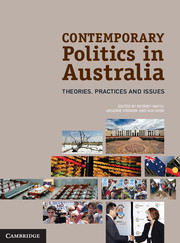Book contents
- Frontmatter
- Contents
- Tables and figures
- Contributors
- Acknowledgements
- Introduction
- I Contemporary Theories of Australian Politics
- Part II Politics in Everyday Australian Life
- Part III Elections
- Part IV Participation and Representation
- Introduction to Part IV
- 15 Participation and representation through political parties
- 16 Pressure groups and lobbying
- 17 Participatory and collaborative governance
- 18 New forms of participation and social movements
- Part V Inside the Australian State
- Part VI Contemporary Public Controversies
- Glossary
- References
- Index
- References
18 - New forms of participation and social movements
from Part IV - Participation and Representation
Published online by Cambridge University Press: 05 June 2012
- Frontmatter
- Contents
- Tables and figures
- Contributors
- Acknowledgements
- Introduction
- I Contemporary Theories of Australian Politics
- Part II Politics in Everyday Australian Life
- Part III Elections
- Part IV Participation and Representation
- Introduction to Part IV
- 15 Participation and representation through political parties
- 16 Pressure groups and lobbying
- 17 Participatory and collaborative governance
- 18 New forms of participation and social movements
- Part V Inside the Australian State
- Part VI Contemporary Public Controversies
- Glossary
- References
- Index
- References
Summary
This chapter argues that the ways in which individual citizens engage with politics are changing. It is different to the three previous chapters in this section, as it focuses on individual and thus behavioural change (see Chapter 3), not on how institutions mediate the relationship between the state and society. The chapter argues that broadening our understanding of democracy (see Chapter 1) to focus on both individuals and social movements helps us to engage critically with how politics can be more responsive to the political views and experiences of citizens. As in the last chapter, critical theorists might ask whether this shift results in fundamental socio-economic changes (Chapter 4). To the extent that this broadening of participation might also be the result of, or produce, new discourses of politics, it will be of interest to discourse theorists and post-structuralists (Chapter 5).
- Type
- Chapter
- Information
- Contemporary Politics in AustraliaTheories, Practices and Issues, pp. 199 - 210Publisher: Cambridge University PressPrint publication year: 2012
References
- 1
- Cited by



